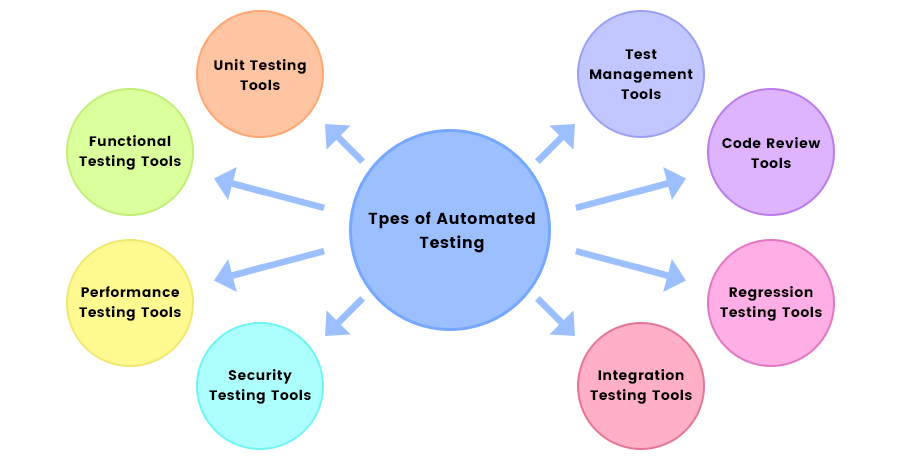
Posted on Wednesday, Mar 29th, 2023
Automated Testing: The Key to Efficient and Effective Software Testing
Spread the love
As software applications become more complex, testing them manually becomes increasingly time-consuming and error-prone. Automated testing has emerged as a solution to this problem, allowing developers to test their software quickly, efficiently, and accurately.
What is Automated Testing?
Automated testing is the use of software tools to execute test cases automatically, as opposed to manual testing, where a human tester executes test cases manually. It can simulate user interactions with the software, such as clicking buttons, entering data, and navigating menus.This can be used for different types of tests, including unit tests, integration tests, and acceptance tests. Unit tests are used to test individual functions or modules of the software, while integration tests are used to test how different parts of the software work together. Acceptance tests are used to verify that the software meets the requirements of the users.
Benefits of Automated Testing
Faster Testing: Automated testing can execute test cases much faster than manual testing, allowing developers to get feedback on the software more quickly. This is particularly important in agile development environments, where fast feedback is critical to delivering software on time.Consistency: Automated testing eliminates the human factor in testing, which can lead to inconsistent results. Automated tests are executed in the same way every time, ensuring consistent results and reducing the risk of errors.
Better Test Coverage: Automated testing can execute a large number of test cases in a short amount of time, allowing developers to test more aspects of the software than they would be able to with manual testing.
Cost Savings: While there is an upfront cost to developing automated tests, in the long run, automated testing can save money. Automated tests can be executed quickly and easily, reducing the need for manual testing, which can be expensive and time-consuming.
Various Types of Automated Testing

There are several types of automated testing software available in the market, some of which are:
Unit Testing Tools: These tools automate the testing of individual components or units of code. Examples include JUnit for Java, NUnit for .NET, and pytest for Python.
Functional Testing Tools: The tools automate the testing of the functionality of an application. Examples include Selenium WebDriver for web applications, Appium for mobile applications, and Ranorex for desktop applications.
Performance Testing Tools: These tools automate the testing of an application's performance, including its response time, scalability, and resource usage. Examples include JMeter, LoadRunner, and Gatling.
Security Testing Tools: These tools automate the testing of an application's security, including vulnerability scanning, penetration testing, and code analysis. Examples include OWASP ZAP, Burp Suite, and Nessus.
Integration Testing Tools: The tools automate the testing of how different components of an application work together. Examples include SoapUI for web services and Apache Kafka for message queueing.
Regression Testing Tools: The tools automate the testing of whether changes to an application have introduced new bugs or caused existing ones to reappear. Examples include TestComplete, Telerik Test Studio, and SmartBear.
Code Review Tools: These tools automate the reviewing of code by checking for errors, identifying code smells, and enforcing coding standards. Examples include SonarQube, CodeClimate, and Crucible.
Test Management Tools: The tools automate the management of the testing process, including test case creation, test execution, and test reporting. Examples include HP ALM, Jira, and TestRail.
Overall, automated testing software can help improve the quality of software and speed up the testing process, making it more efficient and cost-effective.
Challenges of Automated Testing
Test Maintenance
Automated tests need to be maintained regularly to ensure they remain accurate and relevant. Changes to the software may require changes to the tests, which can be time-consuming and require additional resources.Test Design
Designing effective automated tests can be challenging. Tests need to be designed to cover all the important aspects of the software, while avoiding false positives and negatives.Tool Selection
There are many automated testing tools available, each with its own strengths and weaknesses. Selecting the right tool for the job can be challenging and requires careful consideration.Specialization
The company can specialize in a particular type of automated testing, such as security testing, performance testing, or accessibility testing. By focusing on a specific area of expertise, the company can establish itself as an authority in that field.Customization
The company can offer customized testing solutions tailored to the specific needs of its clients. By working closely with clients and understanding their unique requirements, the company can differentiate itself from competitors who offer more generic testing services.Scalability
The company can offer automated testing services that are scalable and can adapt to the changing needs of its clients. This can be particularly appealing to larger organizations that require testing services across multiple projects or applications.Reporting
The company can offer detailed and customized reports that provide actionable insights to clients. The reports can highlight areas of improvement and provide recommendations for optimizing the software's performance.Integrations
The company can offer integrations with popular development tools and platforms, such as JIRA or GitHub. By providing integrations that streamline the testing process, the company can make itself more attractive to potential clients.Certifications
The company can obtain certifications in automated testing tools and methodologies. This can provide clients with reassurance that the company is highly skilled and experienced in the latest automated testing techniques.By implementing one or more of these strategies, automated testing companies can set itself apart from its competitors and establish itself as a trusted partner for clients seeking high-quality testing services.
Conclusion
Automated testing has become an essential part of software development, allowing developers to test their software quickly, efficiently, and accurately. With Blue Summit you get highly skilled and experienced automated testing engineer and the best of services among the automated testing companies.To know about our services and skill refer to our page and learn more.
Blue Summit has collaborated with OdiTek Solutions, a frontline custom software development company. It is trusted for its high service quality and delivery consistency. Visit our partner's page today and get your business streamlined.
REFER TO OTHER RELEVANT CONTENTS

Automated Testing: The Key to Efficient and Effective Software Testing
As software applications become more complex, testing them manually becomes increasingly time-consuming and error-prone. Automated testing has emerged as a solution to this problem, allowing developers to test their software quickly, efficiently, and accurately. What is Automated Testing? Automated testing is the use of software...
read more







